Games
Notes on: It's All Fun and Games Until Someone Blows Their Brains Out
With It's All Fun and Games Until Someone Blows Their Brains Out I wanted to create a small set of games that specifically address disturbing themes not usually portrayed in digital games. The content is disturbing but also evidently realized in their mechanics. They do this in various ways, some new and some borrowed from gaming history. In making these games, I hoped that the process behind different forms of violence will be more fully explored by the visitors/interactors.
These games do not involve normal ways of “winning” or “losing”. They should therefore be slightly more accessible than many modern games. I believe it is important to emphasize that these are all created actively for a situational art context. The works are all installation-based to recreate, interface-wise and somewhat spatially, an optimal context for engaging with them.
Don't Get Raped
2012 — Digital game
Part of "It's All Fun and Games Until Someone Blows Their Brains Out"
During August of 2010, I conducted some research on the amount, types and consequences of rape in (mostly) Sweden. Unsurprisingly, most rapes were committed by a person close to the victim. This laid the base for DGR with which I aimed at making an experience of being fooled or tricked by circumstances to direct attention at erroneous/misdirected means of saving oneself from harm, with the main conflict hidden from sight.
Playing the game with a game controller mounted on a pistol grip, the game repurposes the arcade's lightgun-style games, but instead of clear villains the player encounters non-descript humanoids while walking home from the train station. Tasked with shooting down threatening words, the player will have to prove their mettle and not inflict harm on innocent, though scary, people. For each "night" (or level), the music gets more dramatic and tense. Having reached home, another narrative reveals the truer nature of trauma — and it's not one caused by those the player met on the street.



Equalizer I: Justice
2012 — Digital game
Part of "It's All Fun and Games Until Someone Blows Their Brains Out"
Players watch footage of drone strikes and can toggle to several views of a ravaged city. They interact with a game controller that is roughly similar to a TV remote. In one view, a hooded man is held at gunpoint by several military-looking men. All the time, violence and bombings are heard in the background. Nothing happens—until the player understands that what they see can be controlled, inflicting more bombings and even executing the captive man.
In installation settings, this piece is ideally set up as a multi-screen setup: One TV and one "window".



Not a Place of Honor
2012 — Digital game
Part of "It's All Fun and Games Until Someone Blows Their Brains Out"
When videogame players finish their warfaring and leave virtual spaces destroyed and barren these become reclamed and given life again after only moments, recycling it for renewed destruction. In Not a Place of Honor I tie this, here permanent, final non-recurring death, with the nuclear waste disposal project—man being a ghost in landscapes that have far out-survived him, now a collage of the logistics of war, tombstones for civilization.
In the game, the transfixed arms of the digital soldier are made into disembodied concrete (literally) pieces jutting into the screen. Devoid of any gun, they become truly abstract and useless as ways to interact with a world that has ended.



Welcome Home
2012 — Digital game
Part of "It's All Fun and Games Until Someone Blows Their Brains Out"
In a play on how migration has moved from ethical and integration-oriented to rote administration, Welcome Home puts the player in the seat of an immigration officer. Migrants enter the players office, whereupon the player has a simple (?) choice: Yes or no? The cake only has so many pieces, but there are also new days, new people, new promotions to receive for diligently keeping the cake ones own.



Oh Glory
2012 — Digital game
This was a commissioned work done for the theater play 5boys.com by Simona Semenic when it played at Backa Teater in Gothenburg, Sweden.
It's a very loose interpretation of the play, where the game centers on being one of four characters in a family and using violence to keep everyone performing their tasks at their optimum, but not getting too sad to give up, thus ending the game. Using a retro game style of visuals and interaction makes for a stressful old-school experience.

NonViolence
2010/2011 — Digital game for iPad
A tower-defense style puzzle game where you place various military and para-military units around a city to defend against peaceful protesters who are swarming from each corner of the city and moving toward your presidential palace. Dark comedy puzzler for the first generation of iPads.
Unfortunately I am unable to find any images of the game.
Wrong?
2011 — Digital game
Abstract, simple games like Pong may feel like they would be impossible to put some emotional or bigger artistic value in. Wrong? explores what happens when you take the basic mechanism of Pong — bouncing a ball between players — and instead of making it a competition to "score goals", both players need to keep the ball (in the shape of a heart) in play. As an additional hurdle, occasionally boxes will obstruct the path as in the classic game Breakout. Where Pong has no end, in Wrong? the end is represented as death, since players progress time: one year every few seconds. The goal is, as in life, to make it through together.
Unfortunately I am unable to find any images of the game. However, the music is available on the Music page.